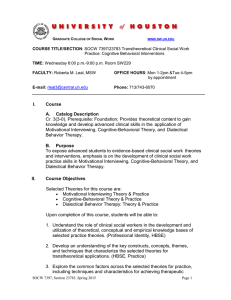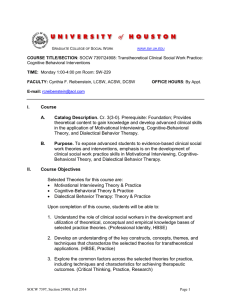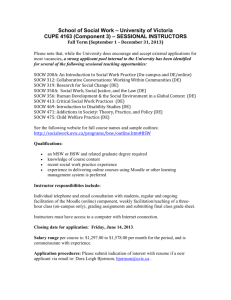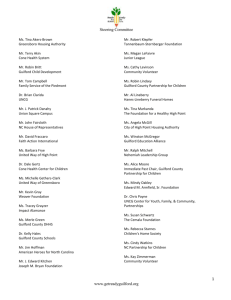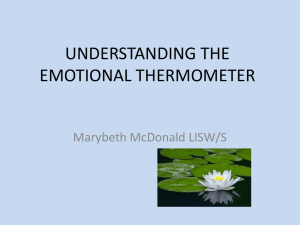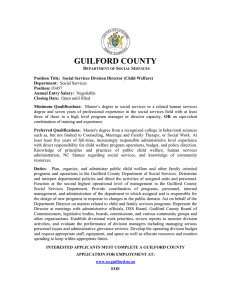Cr. 3(3-0). Prerequisite: Foundation; Provides theoretical content to gain I.
advertisement
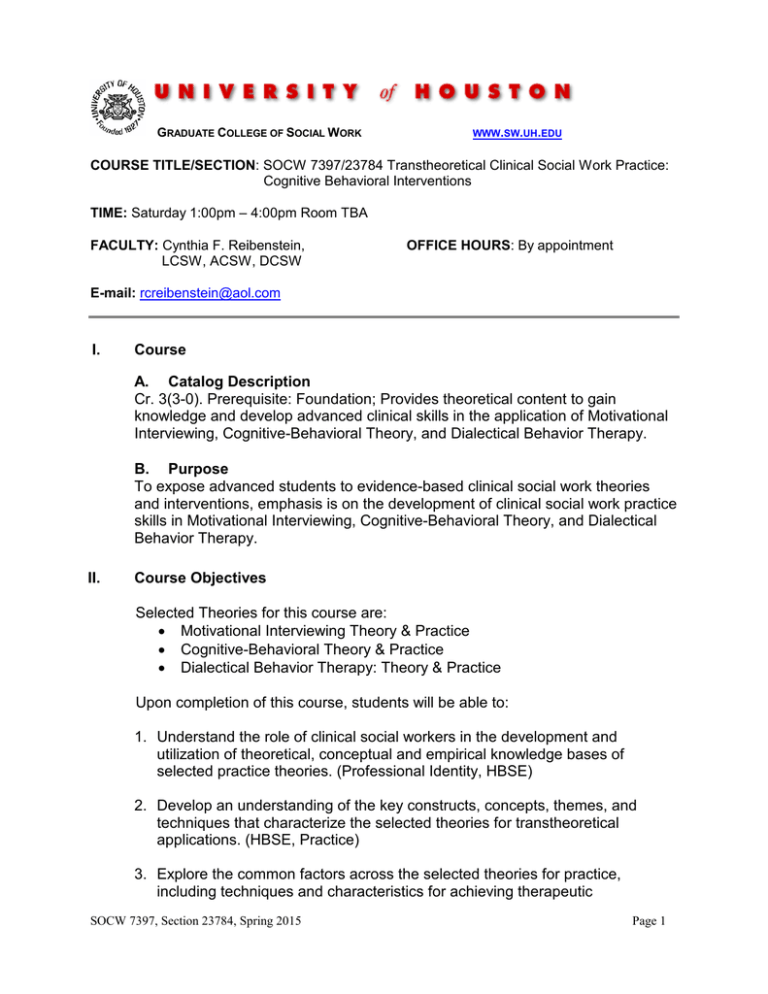
GRADUATE COLLEGE OF SOCIAL WORK WWW.SW.UH.EDU COURSE TITLE/SECTION: SOCW 7397/23784 Transtheoretical Clinical Social Work Practice: Cognitive Behavioral Interventions TIME: Saturday 1:00pm – 4:00pm Room TBA FACULTY: Cynthia F. Reibenstein, LCSW, ACSW, DCSW OFFICE HOURS: By appointment E-mail: rcreibenstein@aol.com I. Course A. Catalog Description Cr. 3(3-0). Prerequisite: Foundation; Provides theoretical content to gain knowledge and develop advanced clinical skills in the application of Motivational Interviewing, Cognitive-Behavioral Theory, and Dialectical Behavior Therapy. B. Purpose To expose advanced students to evidence-based clinical social work theories and interventions, emphasis is on the development of clinical social work practice skills in Motivational Interviewing, Cognitive-Behavioral Theory, and Dialectical Behavior Therapy. II. Course Objectives Selected Theories for this course are: • Motivational Interviewing Theory & Practice • Cognitive-Behavioral Theory & Practice • Dialectical Behavior Therapy: Theory & Practice Upon completion of this course, students will be able to: 1. Understand the role of clinical social workers in the development and utilization of theoretical, conceptual and empirical knowledge bases of selected practice theories. (Professional Identity, HBSE) 2. Develop an understanding of the key constructs, concepts, themes, and techniques that characterize the selected theories for transtheoretical applications. (HBSE, Practice) 3. Explore the common factors across the selected theories for practice, including techniques and characteristics for achieving therapeutic SOCW 7397, Section 23784, Spring 2015 Page 1 outcomes. (Critical Thinking, Practice, Research) 4. Analyze the strengths and limitations associated with selected theories for practice with diverse clients, issues and settings. (Diversity, Practice, Professional Context) 5. Utilize a strengths perspective to select and apply the selected theories with skills and techniques that are used in a culturally competent manner across individual, group, community and societal settings (Diversity, Professional Context, Practice) 6. Demonstrate through hands-on practice the selection and application of various skills and techniques from the selected models for clinical practice. (Critical Thinking, Practice) 7. Identify the potential challenges inherent in the application of selected theories and apply professional and ethical guidelines to address them. (Values & Ethics, Justice, Practice) Motivational Interviewing Theory and Practice Module Description: Motivational Interviewing (MI) is a person-centered, directional, evidence-based counseling method utilized to elicit and strengthen intrinsic motivation for positive change. Researchers have demonstrated the effectiveness of MI with behaviors such as substance abuse, smoking cessation, diet and exercise, and high risk sexual behaviors. Much of the evidence for MI and adaptations of MI (AMI) comes from randomized control trials. This course will introduce students to the basic underlying spirit, person-centered counseling style, language of change, and processes of MI. Theory, evidence base, and skills of MI will be taught synergistically in an effort to provide an experiential process of learning. Students will be given opportunities to practice skills and will receive continual coaching on their use of skills and embodiment of MI spirit. Because of the brevity of the course, this four week module will focus primarily on evidence based skills used in MI across various settings and populations that are familiar to professional social workers. Module Objectives: Upon completion of the 4 week module the student will be able to: 1. Understand and demonstrate the basic concepts, spirit and core strategies of MI. 2. Apply basic skills of open ended questions, reflective listening, affirming and summarizing statements. 3. Understand the Transtheoretical Model of Change and how it relates to MI. 4. Understand how MI aligns with social work values and how MI can be applied in social work settings. 5. Critically evaluate the empirical literature on MI. SOCW 7397, Section 23784, Spring 2015 Page 2 6. Understand ethical dilemmas of discussing motivation for change in restricted settings or other limiting scenarios. 7. Apply MI in a culturally competent manner. 8. Appreciate the methods and theory of application of Motivational Interviewing in diverse populations and settings. Cognitive-Behavioral Theory and Practice Module Description: The Cognitive-Behavioral Therapy (CBT) Module in this advanced clinical practice course will focus on the acquisition and practice of behavioral and cognitive-behavioral skills and techniques as applied to disorders commonly seen by social workers in family clinics, group health clinics, community mental health centers, psychiatric hospitals and other settings where social and emotional problems are treated. Students will gain knowledge of behavioral terminology and principles, and will acquire and practice clinical skills and techniques that form the basis of CBT treatment protocols for mood and anxiety disorders, which have broader applicability to other disorders and conditions. The emphasis is on skill-building, and students will spend the bulk of their time learning and practicing skills and techniques through observation and dyadic role-playing. Students will also learn to evaluate their use-of-self as therapists in these exercises. Module Objectives: Upon completion of the 4 week module, students will be able to: 1. Articulate the theoretical foundations of behavioral and cognitive-behavioral change strategies. 2. Implement a variety of behavioral and cognitive-behavioral techniques, with a focus on selecting and applying techniques from evidence-based protocols for mood and anxiety disorders; individualizing clinical approach and methods for specific clients; and evaluating the therapist’s own use of self in exercises. 3. Discuss issues related to the use of behavioral and cognitive-behavioral therapy techniques with individuals of different races, ethnicities, cultures, classes, genders, sexual orientations, religions, physical and mental abilities, ages and national origins, as well as values and ethics within the context of legal and NASW code guidelines. 4. Recognize and articulate the strengths and limitations of various behavioral and cognitive-behavioral techniques. Dialectical Behavior Therapy: Theory and Practice Module Description: The Dialectical Behavior Therapy (DBT) Module in this advanced clinical practice course will focus on the acquisition and practice of DBT skills and techniques as applied to the treatment of chronic suicidality and self-injurious behaviors in clients with Borderline Personality Disorder (BPD) and other related psychiatric diagnoses (e.g., Eating Disorders, Mood and Anxiety Disorders, and Substance Abuse Disorders). Students will learn about the biological, social and psychological characteristics of individuals with BPD and other psychiatric disorders that involve SOCW 7397, Section 23784, Spring 2015 Page 3 problems related to behavior and mood regulation. Students will gain knowledge of the theoretical perspectives, empirical foundations, and treatment strategies of DBT, including mindfulness and acceptance strategies, and will be able to select and use appropriate techniques in their practice. The emphasis is on skill-building, and students will spend the bulk of their time learning and practicing skills and techniques through observation and dyadic role-playing. Module Objectives: Upon completion of this 4 week module, students will be able to: 1. Articulate the biological, social and psychological characteristics of individuals with BPD and other psychiatric disorders that involve problems related to behavior and mood regulation. 2. Describe the theoretical perspectives, empirical foundations, and treatment strategies of DBT, including mindfulness and acceptance strategies. 3. Assess clients within a DBT framework, identify targets for change, and evaluate the impact of the skills and strategies used. 4. Discuss and critically review the empirical evidence for DBT. 5. Describe the professional and ethical guidelines relevant to working with clients with chronic mental health issues. III. Course Structure A. This 14-week course will follow the following structure: a. First Class: Orientation to the course, overview of Evidence-Based Practices in Social Work, and discussion of the Transtheoretical Model of Behavior Change and Common Factors Approaches to clinical social work practice. b. Classes 2 through 5: Motivational Interviewing Module. c. Classes 6 through 9: Cognitive-Behavioral Therapy Module. d. Classes 10 through 13: Dialectical Behavior Therapy Module. e. Fourteenth Class: Wrap-Up, discussion of integrated practice, next steps. B. The main focus of the course is skill acquisition. As such, there will be limited lecturing and students must read assigned materials and view assigned videos prior to class. The initial class of each module will be devoted to an overview of that particular change orientation (i.e., MI, CBT, and DBT), a discussion of its theoretical underpinnings and empirical evidence, and a synopsis of the different techniques and specific skills drawn from that change orientation. The bulk of time in each module will be devoted to learning and practicing the skills with the help of scripted case vignettes/role plays. SOCW 7397, Section 23784, Spring 2015 Page 4 IV. Textbooks A. Required Textbooks. Because this course is in essence three courses in one, there are four required textbooks: one per module (MI, CBT, and DBT) and a fourth book that is organized by techniques (each chapter is a specific technique). While we are mindful of the cost of textbooks, be assured that these four titles will make valuable additions to your personal library and as a practicing clinical social worker you will get much mileage out of them. The four required textbooks are: 1. Beck, J. S. (2011). Cognitive Behavior Therapy: Basics and Beyond, Second Edition. New York: The Guilford Press. This will be available on Blackboard. 2. Linehan, M. M. (1993). Cognitive-Behavioral Treatment of Borderline Personality Disorder. New York: Guilford Press. 3. Miller, William R., & Rollnick, Stephen. (2013). Motivational Interviewing: Helping People Change, Third Edition. New York: The Guilford Press. 4. O’Donohue, William, & Fisher, Jane E. (Editors, 2009). Cognitive Behavior Therapy: Applying Empirically Supported Techniques in Your Practice, Second Edition. New Jersey: John Wiley & Sons, Inc. [IN CLASS PRESENTATION] This book will be available on Blackboard. B. Recommended Textbooks. In addition to the four required textbooks, there are several texts specific to MI, CBT and DBT that are also worth your consideration. 1. Dimeff, Linda A. & Koerner, Kelly. (2007). Dialectical Behavior Therapy in Clinical Practice: Applications Across Disorders and Settings. New York, The Guilford Press. 2. Leahy, Robert L. (2003). Cognitive Therapy Techniques: A Practitioner’s Guide. New York, The Guilford Press. 3. Linehan, M.M. (1993b). Skills Training Manual for Treating Borderline Personality Disorder. New York: Guilford Press. 4. Miller, A.L., Rathus, J.H., & Linehan, M.M. (2006). Dialectical Behavior Therapy with Suicidal Adolescents. New York: Guilford Press. SOCW 7397, Section 23784, Spring 2015 Page 5 5. Naar-King, Sylvie, & Suarez, Mariann. (2011). Motivational Interviewing with Adolescents and Young Adults. New York: The Guilford Press. 6. O’Donohue, William, Fisher, Jane E. & Hayes, Steven C. (Editors, 2003). Cognitive Behavior Therapy: Applying Empirically Supported Techniques in Your Practice. New Jersey: John Wiley & Sons, Inc. 7. Prochaska, J. O., & Norcross, J. C. (2010). Systems of Psychotherapy: A Transtheoretical Analysis (7th Edition). Belmont CA: Thompson Brooks/Cole. 8. Rollnick, Stephen, Miller, William R., & Butler, Christopher C. (2008). Motivational Interviewing in Health Care. New York: The Guilford Press. 9. Sprenkle, D. H., Davis, S. D., & Lebow, J. L. (2009) Common Factors in Couple and Family Therapy: The Overlooked Foundation for Effective Practice. New York: Guilford Press. 10. Cheung, M., & Leung, P. (2008). Multicultural practice and evaluation: A case approach to evidence-based practice. Denver, CO: Love Publishing Co. C. Journal Articles. Peer-reviewed journal articles will be assigned as well. The UH library has full text articles online through the electronic resources section. Students are also encouraged to register for remote access to the HAM-TMC Medical Library at the M. D. Anderson Library Service Desk, which allows students to access other mental health journal resources. Assigned journal articles will be listed in the syllabus and if possible will be in your Blackboard Page. D. The Practice Planner Series at www.practiceplanners.wiley.com is highly recommended. The Treatment Planners “contain over 1,000 pre-written treatment goals, objectives, and interventions organized around main presenting problems for quick reference and easy adaptation,” while the Progress Notes Planners “cover a comprehensive array of treatment approaches and provide pre-written progress notes for the behavioral problems and DSM categories found in each corresponding Treatment Planner.” They also have Homework Planners, Complete Planners, and Client Education Handout Planners. Especially useful for beginning clinicians. E. Videos. In addition to the streamed video-recorded lectures and clinical videos, students can access a variety of clinical videos at the following link http://ctiv.alexanderstreet.com.ezproxy.lib.uh.edu/ F. Additional texts/supplemental references. Section X: Bibliography. SOCW 7397, Section 23784, Spring 2015 Page 6 V. Course Requirements A. Attendance and Participation. Students are expected to attend all classes and arrive to class on time. If you miss more than 2 classes, whether excused or unexcused, your grade will be dropped one letter grade. Each student gives feedback on other student’s skill presentation and participates in the in class exercises. (20%) See Rubric for more details. B. Reading Assignments. Students must complete all assigned readings from required and supplemental texts and view all assigned clinical videos prior to class, be prepared to engage in class discussion and role play activities, and will receive credit for participation. This is demonstrated in the participation in requirement A. C. In-class demonstrations of specific skills and techniques (one per module). Each student will work with a classmate, and the dyad will be demonstrating a skill/technique to the class. The student dyad will work from the scenario given in class that day. Therefore everyone must be prepared from the assignments due in order to practice and then perform the skill/technique from the scenario given. Each of the tw0 presentations will represent 25% of the students’ grade (50% of grade). See Rubric for more details. D. Presentation. Each student will be assigned a topic/technique to research and present the empirical evidence to the class (20% of grade). Dates are chosen first day. See Rubric for more details. E. Integrated Clinical Exam. A comprehensive multiple choice exam over the readings and the presentations. You will have one hour for the exam. This represents 10% of the grade. VI. Evaluation and Grading The following standard grading scale has been adopted for all courses taught in the college. A = A- = B+= B = B- = VII. 96-100% of the points 92-95.9% 88-91.9% 84-87.9% 80-83.9% C+ = 76-79.9% C = 72-75.9% C- = 68-71.9% D = 64-67.9% F = Below 64% Policy on grades of I (Incomplete): The grade of "I" (Incomplete) is a conditional and temporary grade given when students are either (a) passing a course or (b) still have a reasonable chance of SOCW 7397, Section 23784, Spring 2015 Page 7 passing in the judgment of the instructor but, for non-academic reasons beyond their control have not completed a relatively small part of all requirements. Students are responsible for informing the instructor immediately of the reasons for not submitting an assignment on time or not taking an examination. Students must contact the instructor of the course in which they receive an “I” grade to make arrangements to complete the course requirements. Students should be instructed not to re-register for the same course in a following semester in order to complete the incomplete requirements. The grade of "I" must be changed by fulfillment of course requirements within one year of the date awarded or it will be changed automatically to an "F" (or to a "U" [Unsatisfactory] in S/U graded courses). The instructor may require a time period of less than one year to fulfill course requirements, and the grade may be changed by the instructor at any time to reflect work completed in the course. The grade of "I" may not be changed to a grade of W. VIII. Course Schedule and Assignments A. Assignments: As per section V above. B. Course Schedule. The spring 2015 session runs for 14 weeks, C. A note on technology. As clinical social workers, you would not answer your cell phone or pager, check your email, or surf the web while meeting with your client. Since this class is part of your professional preparation, the same level of professionalism is expected of all students. Students are encouraged to turn off cell phones, smart phones, I-phones, I-pads, pagers, laptops, and any other technology that might interfere with focusing on the class. Students are to monitor themselves on this point, but I reserve the right to ask a student to put away or disengage from their technology. D. Consultation. Before class or by appointment. E. Policy on Academic Dishonesty and Plagiarism. Students are expected to demonstrate and maintain a professional standard of writing in all courses, do their own work, give credit for the ideas of others, and provide proper citation of source materials. Any student who plagiarizes any part of a paper or assignment or engages in any form of academic dishonesty will receive an “I” for the class with a recommendation that a grade of F be assigned, subsequent to a College hearing, in accordance with the University policy on academic dishonesty. Other actions may also be recommended and/or taken by the College to suspend or expel a student who engages in academic dishonesty. All papers and written assignments must be fully and properly referenced using APA style format (or as approved by the instructor), with credit given to the authors whose material or ideas you have used. If you are using direct SOCW 7397, Section 23784, Spring 2015 Page 8 quotes from a specific author (or authors), you must set the quote in quotation marks or use an indented quotation form. For all direct quotes, you must include the page number(s) in your text or references. Any time that you use more than four or five consecutive words taken from another author, you must clearly indicate that this is a direct quotation. Please consult the current APA manual for further information. Academic dishonesty includes using any other person’s work and representing it as your own. This includes (but is not limited to) using graded papers from students who have previously taken this course as the basis for your work. It also includes, but is not limited to submitting the same paper to more than one class. If you have any specific questions about plagiarism or academic dishonesty, please raise these questions in class or make an appointment to see instructor. This statement is consistent with the University Policy on Academic Dishonesty that can be found in your UH Student Handbook. F. Statement on changes to syllabus. As instructor, I reserve the right to revise the syllabus content and/or schedule for time management or topical reasons. G. Week-by-Week Schedule. See below. Syllabus Spring 2015—Weekend College Week 1: Week of January 24, 2015 Topics: Orientation to the course; Overview of evidence-based practices in social work; Transtheoretical model of behavior change; Common factors approaches to clinical social work practice. Presentation schedule completed. Textbook Readings: (Blackboard) • Prochaska & Norcross (2010), Ch. 1 (Defining and Comparing the Psychotherapies) • Sprenkle, Davis, & Lebow (2009), Ch. 2 (A Brief History of Common Factors) • Prochaska & DiClemente (2003), Ch. 9 (The Transtheoretical Approach) Journal Articles: (Blackboard) • Lambert, M. J. (2005). Early response in psychotherapy: Further evidence for the importance of common factors rather than "placebo effects". Journal of Clinical Psychology, 61(7), 855-869. • Prochaska, J. O., DiClemente, C. C., & Norcross, J. C. (1992). In search of how people change: Applications to addictive behaviors. American Psychologist, 47(9), 1102-1114. • Prochaska, J. O., & Velicer, W. F. (1997). The transtheoretical model of health behavior change. American Journal of Health Promotion, 12(1), 38-48. SOCW 7397, Section 23784, Spring 2015 Page 9 Week 2: Week of January 31, 2015 Topics: Motivational Interviewing (Introduction to MI; Spirit of MI; Engagement; Listening; OARS) Textbook Readings: • Miller & Rollnick (2013), Chapters 1, 2, 3, 4, 5, 6, 7 . 8, 9, 10, 11, 12, 13 • O’Donohue & Fisher (2008), Chapter 44 Motivational Interviewing Video: • Motivational Interviewing, William Miller (Blackboard or this link below http://ctiv.alexanderstreet.com.ezproxy.lib.uh.edu/view/1778832/play/true/) Presentations: • O’Donohue & Fisher (2008), Chapters 5, 15, 53, 49, 54 Week 3: Week of February 7, 2015 Topics: Cognitive Behavior Therapy (Introduction to CBT; Overview of treatment; Cognitive conceptualization; Evaluation session; First therapy session) Textbook Readings: • Beck (2011), Chapters 1, 2, 3, 4, 5, 6 Presentations: • O’Donohue & Fisher (2008), Chapters 68, 6, 10, 37, 38 Week 4: Week of February 14, 2015 (off site work) Textbook Readings: • Miller & Rollnick (2013), Chapters 14, 15, 16, 17, 18 , 19, 20, 21, 22, 23, 24,25, 26 Role Plays Practice with Partner Week 5: Week of February 21, 2015 Topics: Skill Integration—MI with CBT, Stages of Change Textbook Readings: • Miller & Rollnick (2002), Chapters 1 Why do people change? (Blackboard) • Cognitive-Behavioral Child Therapy, in Child Therapy with the Experts (Allyn & Bacon, 2002), http://ctiv.alexanderstreet.com.ezproxy.lib.uh.edu/view/1778880 Presentations: • O’Donohue & Fisher (2008), Chapters 9, 12, 13, 14, 18 SOCW 7397, Section 23784, Spring 2015 Page 10 Case Demonstrations: CBT with MI Week 6: Week of February 28, 2015 Topics: Dialectical Behavior Therapy (BPD: Concepts, Controversies, and Definitions; Dialectical and Biosocial Underpinnings of DBT; Dialectical Dilemmas; Overview of Treatment: Targets, Strategies, and Assumptions; Behavioral Targets; Structuring Treatment) Textbook Readings: • Linehan (1993), Chapters 1, 2, 3, 4, 5, 6 Case Demonstrations: CBT with MI Week 7: Week of March 7, 2015 (off site work) Topics: Cognitive Behavior Therapy (Second session and beyond; Problems with structuring the therapy session; Identifying, evaluating and responding to automatic thoughts; Identifying emotions) Textbook Readings: • Beck (2011), Chapters 7, 8, 9, 10, 11, 12 Videos: • Cognitive-Behavioral Feminist Therapy (Psychotherapy.net, 1997), http://ctiv.alexanderstreet.com.ezproxy.lib.uh.edu/view/1778991 • Mixed Anxiety and Depression: A Cognitive-Behavioral Approach, in Assessment & Treatment of Psychological Disorders (Psychotherapy.net, 2006), http://ctiv.alexanderstreet.com.ezproxy.lib.uh.edu/view/1778922 Role Plays with Partner Week 8: Week of March 14, 2015 (off site work) Topics: Cognitive Behavior Therapy (Identifying and modifying beliefs; Additional techniques; Imagery; Homework; Termination and relapse prevention; Treatment planning) and Cognitive Behavior Therapy (Problems in therapy; Progressing as a CB therapist) Textbook Readings: • Beck (2011), Chapters 13, 14, 15, 16, 17, 18, 19, 20, 21 • Linehan (1993), Chapters 7, 8, 9, 10, 11 Videos (In library) • Linehan (1995).Understanding Borderline Personality Disorder: The Dialectical Approach. Week 9: Week of March 28, 2015 SOCW 7397, Section 23784, Spring 2015 Page 11 Topics: Dialectic Behavior Therapy Textbook Readings: review last week readings from Linehan Video: Linehan (1995). Treating Borderline Personality Disorder: The Dialectical Approach. Presentations: • O’Donohue & Fisher (2008), Chapters 24, 40, 57, 62, 69, 4, 17, 19 Week 10: Week of April 4, 2015 (off site work) Topics: Dialectical Behavior Therapy (Stylistic, case management, structural and special treatment strategies) Textbook Readings: • Linehan (1993), Chapters 12, 13, 14, 15 Role play with Partner Week 11: Week of April 11, 2015 Topics: Dialectical Behavior Therapy (Dialectical Strategies; Validation; Problem Solving; Contingency Management; Skills Training) Textbook Readings: review all readings Presentations: • O’Donohue & Fisher (2008), Chapters 23, 73, 74, 50, 60, 63, 75 Case Demonstrations: DBT with MI Week 12: Week of April 18, 2015 (off site work) Textbook Readings: review all readings Role Play with Partner Week 13: Week of April 25, 2015 Topics: Dialectical Behavior Therapy Textbook Readings: Prochaska & Norcross (2010), Chapter 16 (Comparative Conclusions) Case Demonstrations DBT with MI Integrated Clinical Exam (1 hr) Week 14: Week of May 2, 2015 SOCW 7397, Section 23784, Spring 2015 Page 12 Topics: Putting it all together—wrap-up Textbook Readings: review all readings Video: • Integrative Therapy (Blackboard) IX. Policy on academic dishonesty and plagiarism Students are expected to demonstrate and maintain a professional standard of writing in all courses, do one’s own work, give credit for the ideas of others, and provide proper citation of source materials. Any student who plagiarizes any part of a paper or assignment or engages in any form of academic dishonesty will receive an “I” for the class with a recommendation that a grade of F be assigned, subsequent to a College hearing, in accordance with the University policy on academic dishonesty. Other actions may also be recommended and/or taken by the College to suspend or expel a student who engages in academic dishonesty. All papers and written assignments must be fully and properly referenced using APA style format (or as approved by the instructor), with credit given to the authors whose ideas you have used. If you are using direct quotes from a specific author (or authors), you must set the quote in quotation marks or use an indented quotation form. For all direct quotes, you must include the page number(s) in your text or references. Any time that you use more than four or five consecutive words taken from another author, you must clearly indicate that this is a direct quotation. Please consult the current APA manual for further information. Academic dishonesty includes using any other person’s work and representing it as your own. This includes (but is not limited to) using graded papers from students who have previously taken this course as the basis for your work. It also includes, but is not limited to submitting the same paper to more than one class. If you have any specific questions about plagiarism or academic dishonesty, please raise these questions in class or make an appointment to see instructor. This statement is consistent with the University Policy on Academic Dishonesty that can be found in your UH Student Handbook. X. Americans with Disabilities Statement Whenever possible, and in accordance with 504/ADA guidelines, the University of Houston will attempt to provide reasonable academic accommodations to students who request and require them. Please call 713-743-5400 for more assistance. Instructors may not provide accommodations without supporting documentation from the UH Center for Students with Disabilities. SOCW 7397, Section 23784, Spring 2015 Page 13 XI. Bibliography These are additional recommended texts. Students planning to pursue a clinical practice career will want to add some of these their personal library (or start building one). These texts will also be useful resources for class assignments. Copies of most are available in the library. The list is sorted by assessment, diagnosis and treatment; evidence-based practice; practice with diverse populations; mental illness and the media; and recommended websites. This bibliography is a work in progress, so if you identify additional resources that you find useful please inform me so Dr. Ada can add them. Assessment, Diagnosis & Treatment: 1. Ashenberg Straussner, Shulamith Lala. (Editor, 2004). Clinical Work with Substance-Abusing Clients. New York: The Guilford Press. 2. Baker, A. & Velleman, R. (Editors, 2007). Clinical Handbook of Co-Existing Mental Health and Drug and Alcohol Problems. London: Routledge/Taylor & Francis Group. 3. Barlow, D. (Editor, 2008). Clinical Handbook of Psychological Disorders: A Step-by-step Treatment Manual, Fourth Edition. New York: The Guilford Press. 4. Connors, G., Donovan, D. & DiClemente, C. (2001) Substance Abuse Treatment and the Stages of Change. New York: Guilford. ISBN: 1-57230657-2. 5. Dziegielewski, S. F. (2002). DSM-IV-TR in action. New York: Wiley & Sons, Inc. 6. Dziegielewski, Sophia F. (2005). Understanding Substance Addictions: Assessment and Intervention. Chicago: Lyceum Books, Inc. 7. Frances, R. J., Miller, S. I., & Mack, Avram, H. (Editors, 2005). Clinical Textbook of Addictive Disorders, Third Edition. New York: The Guilford Press. 8. Glicken, M. (2004). Using the Strengths Perspective in Social Work Practice. New York: Pearson (Allyn & Bacon). 9. Hepworth, Dean H., Rooney, Ronald H., Rooney, Glenda Dewberry, StromGottfried, Kimberly, & Larsen, JoAnne. (2010). Direct Social Work Practice: Theory and Skills, Eighth Edition. Brooks/Cole CENGAGE Learning. 10. Hersen, M. & Turner, S. M. (2003). Diagnostic Interviewing, Third Edition. New York: Kluwer Academic/Plenum Publishers. 11. Hersen, M., Turner, S. M., & Beidel, D. C. (Editors, 2007). Adult Psychopathology and Diagnosis, Fifth Edition. New Jersey: John Wiley & SOCW 7397, Section 23784, Spring 2015 Page 14 Sons. 12. Kupfer, D., First, M., & Reiger, D. (Editors, 2002). A Research Agenda for DSM-V. American Psychiatric Press: Washington DC. 13. Lambert, M. J. (Editor, 2004). Bergin & Garfield’s Handbook of Psychotherapy and Behavior Change (5th Ed). New York: Wiley & Sons. 14. Miller, W. R. & Rollnick, S. (2002). Motivational Interviewing: Preparing People for Change, Second Edition. New York: The Guilford Press. 15. Millon, T., Grossman, S, Millon, C., Meagher, S., & Ramnath, R. (2004). Personality Disorders in Modern Life, Second Edition. New Jersey: John Wiley & Sons, Inc. 16. Morrison, J. (2006). DSM-IV Made Easy: The Clinician’s Guide to Diagnosis. New York: Guilford Press. 17. Munson, C. E. (2001). The Mental Health Diagnostic Desk Reference: Visual Guides and More for Learning to Use the Diagnostic and Statistical Manual (DSM -IV-TR), Second Edition. New York: Haworth Press, Inc. 18. Norcross, J. C. & Goldfried, M. R. (Editors, 2003). Handbook of Psychotherapy Integration. New York: Oxford University Press. 19. Othmer, E. & Othmer, S. C. (2002). The Clinical Interview Using DSM-IV-TR, Volume 1: Fundamentals. Arlington, VA: American Psychiatric Press, Inc. 20. Othmer, E. & Othmer, S. C. (2002). The Clinical Interview Using DSM-IV-TR, Volume 2: The Difficult Patient. Arlington, VA: American Psychiatric Press, Inc. 21. Patterson, J., Albala, A. A., McCahill, M. E., & Edwards, T. M. (2010). The Therapist’s Guide to Psychopharmacology: Working with Patients, Families, and Physicians to Optimize Care (Revised Edition). N. Y.: The Guilford Press. 22. Saleebey, D. (Editor, 2006). The Strengths Perspective in Social Work Practice, Fourth Edition. Boston: Allyn and Bacon. 23. Satcher, D. (December 1999). Mental Health: A Report of the Surgeon General. 24. Sperry, L. (2003). Handbook of Diagnosis & Treatment of DSM-IV-TR Personality Disorders, Second Edition. New York: Brunner/Mazel. 25. Wachtel, P. L. (1997). Psychoanalysis, Behavior Therapy, and the Relational World. Washington, DC: American Psychological Association Press. SOCW 7397, Section 23784, Spring 2015 Page 15 Evidence-Based Practice: 26. Barrett, P. M. & Ollendick, T. H. (Editors, 2004). Handbook of Interventions that Work with Children and Adolescents: Prevention and Treatment. West Sussex, England: John Wiley & Sons Ltd. 27. Fischer, J. (2009). Toward Evidence-Based Practice: Variations on a Theme. Chicago: Lyceum Books. 28. Freeman, C. & Power, M. (Editors, 2007). Handbook of Evidence-Based Psychotherapies: A Guide for Research and Practice. West Sussex, England: John Wiley & Sons Ltd. 29. Hubble, M., Duncan, B. L., and Miller, S. D., (Editors, 1999). The Heart and Soul of Change: What Works in Therapy. Washington: DC: APA Press. 30. Nathan, P. E. & Gorman, J. M. (Editors, 2002). A Guide to Treatments that Work, Second Edition. New York: Oxford University Press. 31. Norcross, J. C. (Editor, 2002). Psychotherapy Relationships That Work: Therapist Contributions and Contributions and Responsiveness to Patients. New York: Oxford University Press. 32. Norcross, J., Beutler, L., & Levant, R. (2006) Evidence-Based Practices in Mental Health: Debate & Dialogue on the Fundamental Questions. Washington, DC: APA Press. ISBN (paperback):1-591-47-310-1. 33. O’Donohue, W., Fisher, J. E. & Hayes, S. C. (2003). Cognitive Behavior Therapy: Applying Empirically Supported Techniques in Your Practice. New Jersey: John Wiley & Sons, Inc. 34. Roberts, A. R. & Yeager, K. R. (Editors, 2004). Evidence-Based Practice Manual: Research and Outcome Measures in Health and Human Services. New York: Oxford University Press. 35. Roth, A. & Fonagy, P. (2005). What Works for Whom? A Critical Review of Psychotherapy Research, Second Edition. New York: The Guilford Press. 36. Stout, C. E. & Hayes, R. A. (Editors, 2005). The Evidence-Based Practice: Methods, Models, and Tools for Mental Health Professionals. Hoboken, New Jersey: John Wiley & Sons, Inc. Practice with Diverse Populations: 37. Aguirre-Molina, Marilyn, Molina, Carlos W., & Zambrana, Ruth E. (Editors, 2001). Health Issues in the Latino Community. San Francisco: Jossey-Bass. SOCW 7397, Section 23784, Spring 2015 Page 16 38. Cheung, M. & Leung, P. (2008). Multicultural Practice & Evaluation: A Case Approach to Evidence-Based Practice. Denver, COL Love Publishing. 39. Delgado, Melvin. (2007). Social Work with Latinos: A Cultural Assets Paradigm. New York: Oxford University Press. 40. Diller, Jerry V. (2007). Cultural Diversity: A Primer for the Human Services, Third Edition. Belmont, CA: Brooks/Cole CENGAGE Learning. 41. Falicov, Celia Jaes. (2000). Latino Families in Therapy: A Guide to Multicultural Practice. New York: Guilford Press. 42. Furman, R., & Negi, N. (Editors, 2010). Social Work Practice with Latinos. Chicago: Lyceum Books. 43. Gonzalez, Juan. (2000). Harvest of Empire: A History of Latinos in America. New York: Penguin Group. 44. Hogan, Mikel. (2007). The Four Skills of Cultural Diversity Competence: A Process for Understanding and Practice, Third Edition. Belmont, CA: Brooks/Cole CENGAGE Learning. 45. Lum, Doman. (2007). Culturally Competent Practice: A Framework for Understanding Diverse Groups and Justice Issues, Third Edition. Belmont, CA: Thomson Brooks/Cole. 46. McGoldrick, Monica, Giordano, Joe, & Garcia-Preto, Nydia. (Editors, 2005). Ethnicity and Family Therapy, Third Edition. New York: Guilford Press. 47. Organista, Kurt C. (2007). Solving Latino Psychosocial and Health Problems: Theory, Practice, and Population. New Jersey: John Wiley & Sons. 48. Sue, Derald Wing, & Sue, David. (2008). Counseling the Culturally Diverse: Theory and Practice, Fifth Edition. New Jersey: John Wiley & Sons. 49. Telles, Edward E. & Ortiz, Vilma. (2008). Generations of Exclusion: Mexican Americans, Assimilation, and Race. New York: Russell Sage Foundation. Mental Illness and the Media: 50. Gabbard, G. O. & Gabbard, K. (1999). Psychiatry and the Cinema, Second Edition. Arlington, VA: American Psychiatric Publishing, Inc. 51. Hesley, J. W. & Hesley, J. G. (2001). Rent Two Films and Let's Talk in the Morning: Using Popular Films in Psychotherapy, Second Edition. New York: John Wiley & Sons. 52. Noriega, Chon (2000). Shot in America: Television, the State, and the Rise of SOCW 7397, Section 23784, Spring 2015 Page 17 Chicano Cinema. Minneapolis, MN: University of Minnesota Press. 53. Robinson, D. J. (2003). Reel Psychology: Movie Portrayals of Psychiatric Conditions. Port Huron, Michigan: Rapid Psychler Press. Recommended Websites. American Psychological Association: www.apa.org/ Association for Behavioral and Cognitive Therapies: http://www.abct.org/ Beck Institute for Cognitive Behavior Therapy: http://www.beckinstitute.org/ Behavioral Tech, LLC (DBT): http://behavioraltech.org/ Center for Disease Control and Prevention (CDC): http://www.cdc.gov/ Center for Psychoanalytic Studies (formerly HGPI): http://centerforpsychoanalyticstudies.com/ CIA World Fact Book: https://www.cia.gov/library/publications/the-world-factbook/ Effective Interventions (HIV): https://www.effectiveinterventions.org/en/Home.aspx Evidence-Based Intervention Network: http://ebi.missouri.edu/ Houston Psychological Association: www.hpaonline.org/ Jung Center of Houston: http://www.junghouston.org/ Mental Health America: http://www.nmha.org/ Mental Health America of Greater Houston: http://www.mhahouston.org/ Motivational Interviewing: http://www.motivationalinterview.org/ National Alliance on Mental Illness: http://www.nami.org/ National Alliance on Mental Illness—Metropolitan Houston: http://www.namimetropolitanhouston.org/ National Association of Cognitive Behavioral Therapists: http://www.nacbt.org/ National Association of Social Workers: http://www.socialworkers.org/ National Association of Social Workers—Texas: http://www.naswtx.org/ National Center on Minority Health and Health Disparities http://ncmhd.nih.gov/ National Hispanic Council on Aging: http://www.nhcoa.org/ National Institute of Mental Health: http://www.nimh.nih.gov/ National Institute on Alcohol Abuse and Alcoholism: http://www.niaaa.nih.gov/ National Institute on Drug Abuse: http://www.drugabuse.gov/ National Registry of Evidence-Based Programs and Practices: http://www.nrepp.samhsa.gov/ Pew Hispanic Center: http://pewhispanic.org/ PsychCentral: http://psychcentral.com/ Substance Abuse and Mental Health Services Administration: http://www.samhsa.gov/ Texas Psychological Association: http://www.texaspsyc.org/ US Census Bureau: http://www.census.gov/ US Census Bureau American FactFinder: www.factfinder.census.gov/home/saff/main.html?_lang=en US Dept. of Health & Human Services, Office of Minority Health: http://www.omhrc.gov/ SOCW 7397, Section 23784, Spring 2015 Page 18 Cognitive Behavioral Therapy (O’Donohue and Fisher) Chapter Titles Chapter 5: Attribution Change Chapter 15: Communication/Problem Solving Skills Training Chapter 53: Relapse Prevention Chapter 49: Positive Attention Chapter 54: Relaxation Chapter 68: Stress Management Intervention Chapter 6: Behavioral Activation Treatment Chapter 10: Breathing Retraining and Diaphragmatic Breathing Chapter: 37: Interoceptive Exposure for Panic Disorder Chapter 38: Live Exposure (In Vivo) Chapter 9: Bibliotherapy utilizing Cognitive Behavior Chapter 12: Cognitive Defusion Chapter 13: Cognitive Restructuring of the Disputing Irrational Beliefs Chapter 14: Cognitive Restructuring: Behavioral Tests of Negative Cognitions Chapter 18: Behavior Report Cards: Home-School Contingency Management Procedure Chapter 24: Emotional Regulation Chapter 40: Mindfulness Chapter 57: Identifying and Modifying Maladaptive Schemas Chapter 62: Shaping Chapter 69: Systemic Desensitation Chapter 4: Assertiveness Skills and The Management of Related Factors Chapter 17: Contingency Management Interventions Chapter 19: Dialectics in Cognitive and Behavior Therapy Chapter 23: Distress Tolerance Chapter 73: Urge Surfing Chapter 74: Validation Principles and Strategies SOCW 7397, Section 23784, Spring 2015 Page 19
